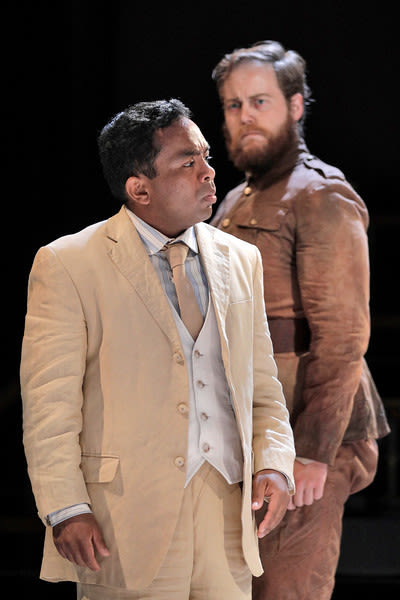Can Portland Opera’s In the Penal Colony Make Kafka Sing?

Martin Bakari as The Visitor and Ryan Thorn as The Officer in Portland Opera's new production of Philip Glass's In the Penal colony.
If Kafka saw books as axes for the frozen seas within us, one wonders how he saw operas, tool-wise. Sledgehammers, maybe?
Kafka’s prickly, disorienting tales of alienation don’t call arias to top of mind, but his celebrated story “In the Penal Colony” is the basis for one of Philip Glass’s most enduring chamber operas. The single-act, 80-minute piece (also titled In the Penal Colony) has been widely produced all over the world since it premiered in Seattle 19 years ago. Last weekend, it came home to the PNW, in a Portland Opera production directed by Imago founder Jerry Mouwad at the Hampton Opera Center.
The libretto follows Kafka’s story almost to the letter. A Visitor (Martin Bakari) travels to a nameless colony where an Officer (Ryan Thorn) doles out bloody justice. The Officer’s methods don’t sit well with the colony’s new, unseen commander, and the Visitor must decide whether to uphold or overthrow them. Questions about moral relativism, regime change, and capital punishment swirl.
Portland Opera’s production is competent, but it’s marred by Glass's inert transfer from page to stage. It’s easy to understand why this piece is so popular: two vocalists, 80 minutes, a sexy “creative giants in conversation” sales pitch. Still, the project has a pungent whiff of “just because we can doesn’t mean we should.” Kafka can get operatic, sure, but his best work unsettles rather than stirs. “In the Penal Colony” works on paper as a dark fable about the changing of the guard; when its characters, both ciphers, gain flesh, the material starts to creak beneath its own weight. The explicit, literal demands of opera smother the quiet, cerebral snap of Kafka’s prose.
It doesn’t help that Mouwad never quite figures out how to make use of the Hampton’s small, in-the-round studio: characters furiously pace the periphery, pivoting over and over again for maximum audience exposure (one crucial piece of exposition that introduces us to a torture device is completely illegible). There are less practical problems, too: with the distance of, say, a proscenium, it would be easier to hook into the show’s chilly allegorical rhythms. Up close, the faux intimacy underlines flat characters and anemic drama.
Still, there are provocative touches. In the opening moments, the players unfurl the set slowly from a bunched-up bloody tarp. They don their costumes; the action begins. Whole cultures, Mouwad seems to say, can be conjured from little more than blood and cloth. And about that cloth: Christine A. Richardson’s muted, Out of Africa-cum-Banana Republic costumes put the “colony” in “penal colony,” all drab earth tones that highlight the violence, when it comes. (Kudos, too, to Kyle Delamarter’s sound design, which gives that violence considerable sting.) And though their roles are largely thankless, Bakari and Thorn both make an impression: Thorn, in particular, nails his portrait of a man almost erotically obsessed with justice; someone cast him as Javert stat.
But at $75 per ticket, the show runs patrons almost a dollar a minute, and its impact dissipates as soon as you step out of the lobby. Kafka’s story still has something to teach us about our thirst for punishment and our fear of change, but Glass’s opera doesn’t do much to further the message.
Sledgehammer, ax, take your pick—after 80 minutes in The Penal Colony, the sea within us remains frozen as ever.
In the Penal Colony
Tues, Thurs, Sat 7:30 p.m., July 30-August 10. Fri July 26 & Sun July 28 at 7:30 p.m. Hampton Opera Center, $75.




